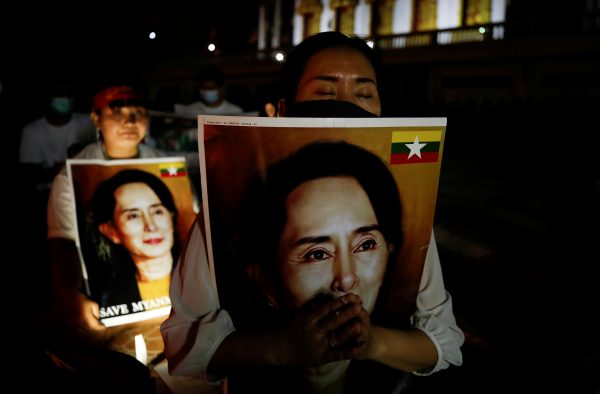The contentious situation is challenging governments if and how they should engage with Myanmar’s military regime. The international community represented by member states at the United Nations appears unable to arrive at an effective consensus towards the turmoil in Myanmar. As states navigate diplomacy and realpolitik, their engagements with Myanmar are coming under increasing scrutiny.
The impasse is drawing attention to any diplomatic signs of movement in the international community towards Myanmar, such as Myanmar’s relationship with the United Kingdom, China’s position and the composition of Myanmar’s participation in April’s ASEAN Leaders’ Meeting. It boils down to the politics of recognition and who can speak on behalf of whom.
In the realm of diplomacy, nuance matters. There is a diplomatic practice that countries recognise states, not governments. This practice provides countries flexibility in their diplomatic engagements, particularly when dealing with a state whose military has taken control of government and is deemed illegitimate by its own people and the international community.
It is over this point that the diplomatic world and the public are diverging. Many people see any recognition of a military appointee as affording the military with recognition to run the country at the expense of its democratically elected government.
Back in April, ASEAN faced this challenge over whether the presence of a military representative at the ASEAN Leaders’ Meeting would constitute the regional body officially recognising the military as the government of Myanmar. At the meeting, Senior General Min Aung Hlaing attended in his position as Commander-in-Chief but was not afforded official recognition as Head of Government.
While this diplomatic ambiguity allowed ASEAN to initially agree on a regional approach to help address the Myanmar crisis, it is yet to break the impasse towards a peaceful settlement. The only agreement that the five permanent members of the UN Security Council have reached through public statements is that the international response to the situation in Myanmar should be led by ASEAN.
Six months after the coup, over 900 people have been killed and over 5300 arrested, charged or sentenced by the military. COVID-19 is rampant, and many are going without the medical attention they need. Some vaccines and medical equipment are supplied by China, the European Union, Singapore and Japan, but not nearly enough for those most in need. Food prices are also rising and the devastating impact of insufficient access to necessities is taking hold.
As Myanmar faces the grim consequences of dual political and pandemic crises, more questions will be raised about the ability of the international community to help people who are suffering. Pressure will continue to mount on ASEAN to act and see through the implementation of its Five-Point Consensus.
So it will be for other countries like the United Kingdom that have been at the forefront in opposing the military regime. China has supplied two million vaccines to Myanmar and 10,000 to the Kachin Independence Army-controlled areas as well as the Wa autonomous region on its border. China has interests and levers to influence the military in Myanmar and concurrently engages with ethnic army-controlled areas as local authorities. How these countries will calibrate their diplomatic engagement with the military regime in Myanmar while attempting to alleviate the worsening humanitarian situation remains to be seen.
Given the efforts initiated by ASEAN to break the impasse in Myanmar, the international community should work with the regional body to fulfil the Five-Point Consensus to support those most in need. The focus needs to be people-centred to engage entities that can deliver assistance directly. This means engaging established networks with access to affected people like China has done in its vaccine distribution. The international community can use trusted partners like the Red Cross Movement, relevant UN agencies and local partners. ASEAN has the potential to provide a platform for engagement to facilitate access to support these efforts.
ASEAN is supported by the international community to facilitate engagement with all parties including the military, the National Unity Government, the Civil Disobedience Movement and ethnic armed groups de facto recognised in the Five-Point Consensus. The Five-Point Consensus provides the framework for action — it is time now for ASEAN to provide a supportive ecosystem to move from words to actions.
While the people of Myanmar remain resilient in the face of adversity, their neighbours and the rest of the international community must focus on helping them deal with the crisis beyond the politics of recognition. While the world of diplomacy is defined largely by the nuanced positions states take for national interest, actors must balance this ambiguity with the need to invest in a more substantive and consistent agenda to find a political resolution and support the people in Myanmar.
Alistair DB Cook is Coordinator of the Humanitarian Assistance and Disaster Relief Programme and Senior Fellow at the Centre for Non-Traditional Security Studies, S Rajaratnam School of International Studies, Nanyang Technological University, Singapore.
Mely Caballero-Anthony is Professor, President’s Chair in International Relations and Security Studies and Head of the Centre for Non-Traditional Security Studies at the S Rajaratnam School of International Studies, Nanyang Technological University, Singapore.


To date ASEAN has shown itself to be wholly inept at resolving the Myanmar crisis or of representing the elected government or NUG. The Security Council, by handing the matter over to ASEAN is effectively pandering to China and Russia and absolving itself of proactively pursuing its own responsibilities; through exploring a peacekeeping mission, negotiating a R2P action and an uambiguous condemnation of the coup itself including the immediate release of the NLD leadership.